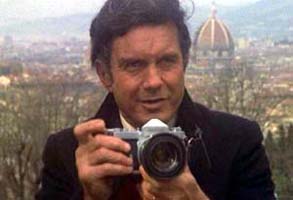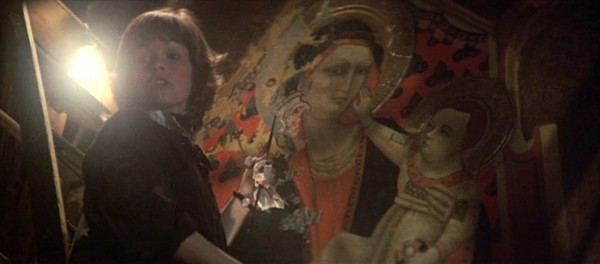October 02, 2006
Postmodernism as Pathology
Ian P is tremendous on Scarface, but I'm not being perverse when I say that, oddly, Scarface is the one major De Palma film that has never particularly moved me, even though I buy everything Ian has to say about its - massive - cultural significance. In fact, it may be because Scarface is too flat with hip-hop, Cribs, gangster chic, that it has left me cold. Gangsta is one of capitalist realism's 'myth of no myths': a myth which presents itself as an exposure and undercutting of fantasy, a biological reduction. As Ian so memorably puts it: '"Is this it? Fuckin, suckin, snortin..." is not just American Dream cynical, it approaches Beckett in its existential fault-line ennui! Is this it? Breathin', eatin, shittin...?'
Ian argues that De Palma is like Hitchcock without the psychopathology. But De Palma's relationship to Hitchcock was itself psychopathological; his films openly staged revivalism as necrophilia. De Palma didn't pay homage to the Master, he stalked him, relentlessly, unable to escape his fixation. At this point I would link to my post on Obsession from the old blogger site (a post that was prompted last time IP and I had a to-and-fro about D-P), but that's all but impossible now that the site has been hacked by corporate interests. So I present it again below, in a slightly remixed form, partly as a prompt - to myself - to write more about De Palma; partly because I hope that it might inspire Bacterial grl, who I know is also fascinated by D-P, to post something on him.
- De Palma remakes Vertigo at least twice: in Body Double and, in what for me is his masterpiece, the appropriately-titled Obsession . His mugging of Hitchcock, his rearrangement of the Master's entrails, is not even close to being subtle. But there's an intriguing implex here: Vertigo - itself, needless to say, a study of obsession/ possession - becomes the object of an obsession, the object of Obsession.
Like the later Body Double , Obsession has a glutinous, heavy, slow-motion feel; it seems to be filmed almost entirely as a dream sequence. (That is what partly what makes Body Double , which ought to be just trash , queasily compelling: it is unreal, patently so, but that unreality has an odd consistency, the consistency of an involuntary private fantasy, and you're kept watching this film about voyeurism by the guilty suspicion that you are voyeurising De Palma.)
Obsession is filmed in a cloying soft-focus, as if it is not only a dream, but a memory (a memory of a dream), as if what is happening is happening in a fatal (No) time, a deja-vu time in which everything that happens is being repeated even as it ostensibly happens for the first time. Vertigo , again. Deja vu: the already seen .
In Scotty's search for a lost, never-present, referent, in his consciousness of the weight of a past one falsifies even as one attempts to re-inhabit it, in his amour fou-driven passion for remaking , De Palma finds an allegory for the postmodern predicament (his own). And ours?
Itself a remake, Obsession is also, fittingly and inevitably, about remaking.
It stars Cliff Robertson, an ageing Southern aristocrat out of Poe, near-paralysed by melancholia. Robertson, we learn, lost his wife and daughter in a bungled kidnap years ago. The police told him not to pay the kidnappers, to fill a suitcase with blank pieces of paper. And that is the appalling, crippling weight he bears now: he chose the money over his family. Money undergoes a negative cathexis, becomes meaningless, or even abhorrent, to him. The fact he has it means that he does not have his wife (Genevieve Bujold) and child.
The image of the young Robertson, the plan to outwit the kidnappers failed/ foiled, the case open, the worthless pieces of paper fluttering in the wind, is an image of total loss: because he dared not risk losing something valuable, he has lost the ability to find value in anything ....
And then, years later, on a convalescent business trip to Italy (his whole life, now, is a kind of failed convalescence, a deathly enduring ) he sees - can it be - a double of his dead wife. Naturally, something awakens in him - Scotty's hopeless hope - a hope born in denial, born in the refusal of the unconscious to believe in death (or time). Can it be? - yet it is impossible, surely, because this is an image of his wife, not as she would be now, but exactly as she looked then .
And he finds that this doppelganger is working on - yes, naturally - a restoration (of a local church). She faces a dilemma: beneath one of the frescoes there is another painting. It could be a great lost masterpiece or it could be --- nothing. Should she risk destroying the fresco for the sake of what might only be a daub?
It goes without saying that this dilemma is doubled in Robertson's: should he investigate, dig deeper, at the risk of ---- destroying this young woman ----- or, worse, as far as he is concerned, destroying his image of her?
And so the film unwinds, (I won't spoil it for those who haven't seen it) towards its climax, which like the end of the first two thirds of Vertigo , amounts to a re-running of the past, an exposure of a plot, the anatomy of a betrayal. Unlike Vertigo , though, Obsession , improbably, ends happily - but it is a vertiginous, disturbing, distinctly creepy, happy ending... Bujold and Robertson spinning round and round and round each other, gripping each other's hands....

